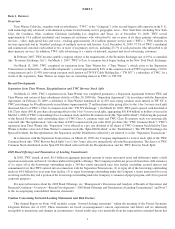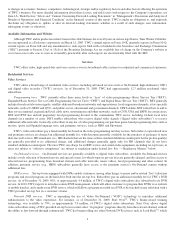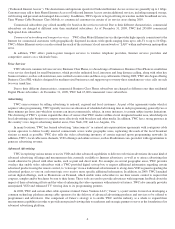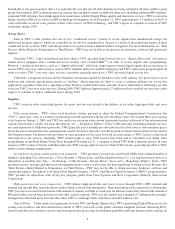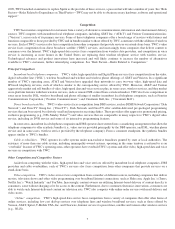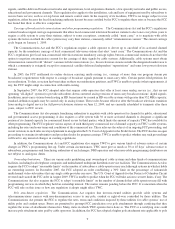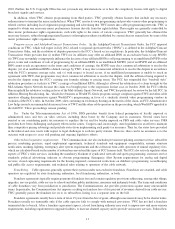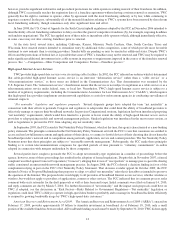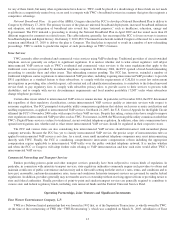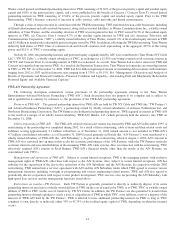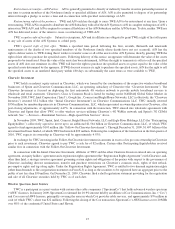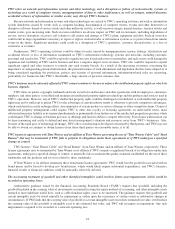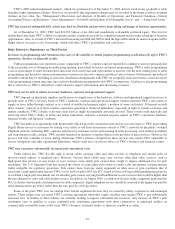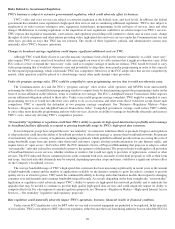Time Warner Cable 2009 Annual Report Download - page 23
Download and view the complete annual report
Please find page 23 of the 2009 Time Warner Cable annual report below. You can navigate through the pages in the report by either clicking on the pages listed below, or by using the keyword search tool below to find specific information within the annual report.2010. Further, the U.S. Copyright Office has not yet made any determinations as to how the compulsory license will apply to digital
broadcast signals and services.
In addition, when TWC obtains programming from third parties, TWC generally obtains licenses that include any necessary
authorizations to transmit the music included in it. When TWC creates its own programming and provides various other programming or
related content, including local origination programming and advertising that TWC inserts into cable-programming networks, TWC is
required to obtain any necessary music performance licenses directly from the rights holders. These rights are generally controlled by
three music performance rights organizations, each with rights to the music of various composers. TWC generally has obtained the
necessary licenses, either through negotiated licenses or through procedures established by consent decrees entered into by some of the
music performance rights organizations.
Program access and Adelphia/Comcast Transactions Order. In the Adelphia/Comcast Transactions Order, the FCC imposed
conditions on TWC, which will expire in July 2012, related to regional sports networks (“RSNs”), as defined in the Adelphia/Comcast
Transactions Order, and the resolution of disputes pursuant to the FCC’s leased access regulations. In particular, the Adelphia/Comcast
Transactions Order provides that (i) neither TWC nor its affiliates may offer an affiliated RSN on an exclusive basis to any MVPD;
(ii) TWC may not unduly or improperly influence the decision of any affiliated RSN to sell programming to an unaffiliated MVPD or the
prices, terms and conditions of sale of programming by an affiliated RSN to an unaffiliated MVPD; (iii) if an MVPD and an affiliated
RSN cannot reach an agreement on the terms and conditions of carriage, the MVPD may elect commercial arbitration to resolve the
dispute; (iv) if an unaffiliated RSN is denied carriage by TWC, it may elect commercial arbitration to resolve the dispute in accordance
with the FCC’s program carriage rules; and (v) with respect to leased access, if an unaffiliated programmer is unable to reach an
agreement with TWC, that programmer may elect commercial arbitration to resolve the dispute, with the arbitrator being required to
resolve the dispute using the FCC’s existing rate formula relating to pricing terms. The FCC has suspended this “baseball style”
arbitration procedure as it relates to TWC’s carriage of unaffiliated RSNs, although it allowed the arbitration of a claim brought by the
Mid-Atlantic Sports Network because the claim was brought prior to the suspension. In that case, in October 2008, the FCC’s Media
Bureau upheld the arbitrator’s ruling in favor of the Mid-Atlantic Sports Network, and TWC has petitioned for review by the full FCC. In
addition, Herring Broadcasting, Inc., which does business as WealthTV, filed a program carriage complaint against TWC and other cable
operators alleging discrimination against WealthTV’s programming in favor of a similarly situated video programming vendors in
violation of the FCC’s rules. In October 2009, after convening an evidentiary hearing on the merits of the claim, an FCC Administrative
Law Judge issued a recommended decision in favor of TWC and the other cable operators in the proceeding, which WealthTVappealed to
the full FCC. These proceedings remain pending.
Tax. Under the Telecommunications Act of 1996, DBS providers benefit from federal preemption of locally imposed or
administered taxes and fees on video services, including those borne by the Company and its customers. Several states have
enacted or are considering parity tax measures to equalize the tax and fee burden imposed on DBS and cable video services. DBS
providers have been challenging such parity efforts in the courts, Congress and, increasingly, state legislatures in an effort to maintain
their competitive pricing advantage and preclude states from implementing such parity tax measures. Thus far, the states have prevailed
in the federal and state courts with respect to legal challenges to such tax parity statutes. However, there can be no assurance as to the
outcome with respect to cases still pending and ongoing legislative efforts.
Other federal regulatory requirements. The Communications Act also includes provisions regulating customer service, subscriber
privacy, marketing practices, equal employment opportunity, technical standards and equipment compatibility, antenna structure
notification, marking, lighting, emergency alert system requirements and the collection from cable operators of annual regulatory fees,
which are calculated based on the number of subscribers served and the types of FCC licenses held. The FCC also actively regulates other
aspects of TWC’s video services, including the mandatory blackout of syndicated, network and sports programming; customer service
standards; political advertising; indecent or obscene programming; Emergency Alert System requirements for analog and digital
services; closed captioning requirements for the hearing impaired; commercial restrictions on children’s programming; recordkeeping
and public file access requirements; and technical rules relating to operation of the cable network.
Franchising. Cable operators generally operate their systems under non-exclusive franchises. Franchises are awarded, and cable
operators are regulated, by state franchising authorities, local franchising authorities, or both.
Franchise agreements typically require payment of franchise fees and contain regulatory provisions addressing, among other things,
upgrades, service quality, cable service to schools and other public institutions, insurance and indemnity bonds. The terms and conditions
of cable franchises vary from jurisdiction to jurisdiction. The Communications Act provides protections against many unreasonable
terms. In particular, the Communications Act imposes a ceiling on franchise fees of five percent of revenues derived from cable service.
TWC generally passes the franchise fee on to its subscribers, listing it as a separate item on the bill.
Franchise agreements usually have a term of ten to 15 years from the date of grant, although some renewals may be for shorter terms.
Franchises usually are terminable only if the cable operator fails to comply with material provisions. TWC has not had a franchise
terminated due to breach. After a franchise agreement expires, a local franchising authority may seek to impose new and more onerous
requirements, including requirements to upgrade facilities, to increase channel capacity and to provide various new services. Federal law,
11


